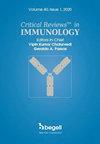Downregulation of miR-503-5p promotes the development of pancreatic cancer via targeting cyclin E2
IF 0.8
4区 医学
Q4 IMMUNOLOGY
引用次数: 0
Abstract
Objective: This study aimed to elucidate the role of microRNA-503 (miR-503) in pancreatic cancer (PC) progression and the underlying regulatory mechanisms. Methods: We acquired miR-503-3p and miR-503-5p expression data along with survival times of PC and normal samples from the UCSC Xena database. Using the t-test, we compared the expression of miR-503-3p and miR-503-5p between PC and normal samples, and evaluated their prognostic significance via Kaplan-Meier survival analysis. The expression of miR-503-5p in PC cells was detected by quantitative PCR. We subsequently overexpressed miR-503-5p in PC cells and examined cell viability, apoptosis, and migration through CCK8 assay, flow cytometry, and Transwell assay, respectively. Potential functional targets were identified using miRTarBase and validated by dual-luciferase reporter assay. Results: Both miR-503-3p and miR-503-5p expression were found to be downregulated in PC; however, only miR-503-5p was linked to cancer prognosis based on public data. In vitro experiments demonstrated that overexpression of miR-503-5p substantially decreased cell viability, induced apoptosis, caused G0/G1 arrest, and inhibited cell migration. miR-503-5p was found to target cyclin E2 (CCNE2), and overexpression of CCNE2 could counteract the effects of miR-503-5p on PC cells. Conclusion: The downregulation of miR-503-5p enhances the progression of PC by targeting CCNE2. The detection of miR-503-5p expression may provide valuable insights for the prevention and prognostic evaluation of PC.下调 miR-503-5p 可通过靶向细胞周期蛋白 E2 促进胰腺癌的发展
研究目的本研究旨在阐明microRNA-503(miR-503)在胰腺癌(PC)进展中的作用及其潜在调控机制:方法:我们从 UCSC Xena 数据库中获取了 miR-503-3p 和 miR-503-5p 的表达数据以及 PC 和正常样本的生存时间。我们用t检验比较了PC样本和正常样本中miR-503-3p和miR-503-5p的表达,并通过Kaplan-Meier生存分析评估了它们的预后意义。我们通过定量 PCR 检测了 miR-503-5p 在 PC 细胞中的表达。随后,我们在 PC 细胞中过表达了 miR-503-5p,并通过 CCK8 检测法、流式细胞术和 Transwell 检测法分别检测了细胞活力、凋亡和迁移。利用 miRTarBase 鉴定了潜在的功能靶点,并通过双荧光素酶报告实验进行了验证:结果:研究发现,miR-503-3p和miR-503-5p在PC中的表达均出现下调;然而,根据公开数据,只有miR-503-5p与癌症预后有关。体外实验表明,miR-503-5p的过表达会大幅降低细胞活力、诱导细胞凋亡、导致G0/G1停滞和抑制细胞迁移。研究发现,miR-503-5p以细胞周期蛋白E2(CCNE2)为靶标,而CCNE2的过表达可抵消miR-503-5p对PC细胞的影响:结论:miR-503-5p的下调通过靶向CCNE2促进PC的进展。结论:miR-503-5p的下调通过靶向CCNE2而促进PC的进展,检测miR-503-5p的表达可为PC的预防和预后评估提供有价值的见解。
本文章由计算机程序翻译,如有差异,请以英文原文为准。
求助全文
约1分钟内获得全文
求助全文
来源期刊
CiteScore
2.60
自引率
0.00%
发文量
14
审稿时长
>12 weeks
期刊介绍:
Immunology covers a broad spectrum of investigations at the genes, molecular, cellular, organ and system levels to reveal defense mechanisms against pathogens as well as protection against tumors and autoimmune diseases. The great advances in immunology in recent years make this field one of the most dynamic and rapidly growing in medical sciences. Critical ReviewsTM in Immunology (CRI) seeks to present a balanced overview of contemporary adaptive and innate immune responses related to autoimmunity, tumor, microbe, transplantation, neuroimmunology, immune regulation and immunotherapy from basic to translational aspects in health and disease. The articles that appear in CRI are mostly obtained by invitations to active investigators. But the journal will also consider proposals from the scientific community. Interested investigators should send their inquiries to the editor before submitting a manuscript.

 求助内容:
求助内容: 应助结果提醒方式:
应助结果提醒方式:


